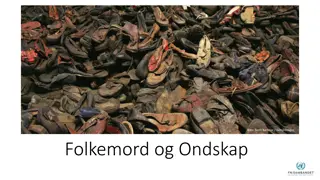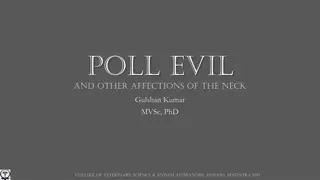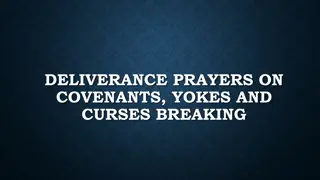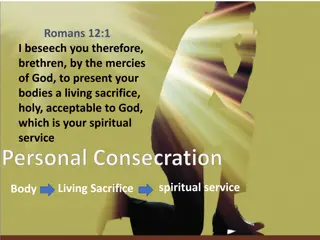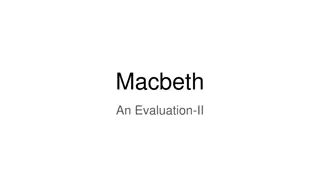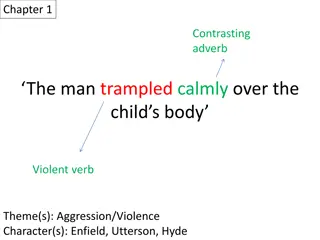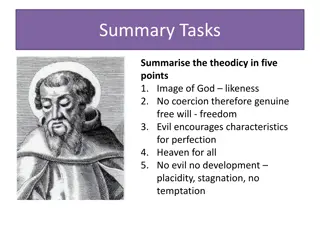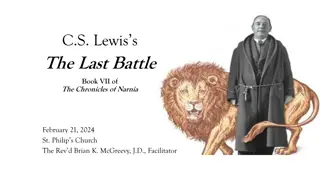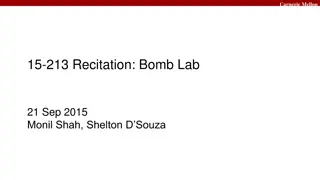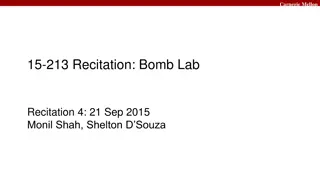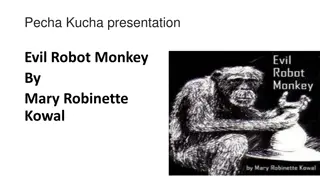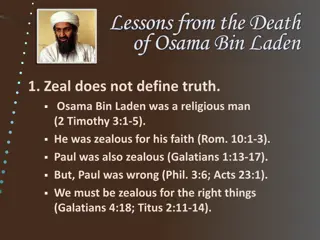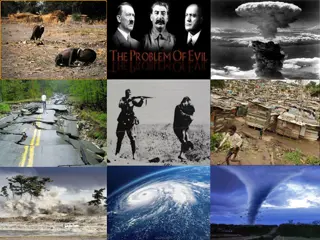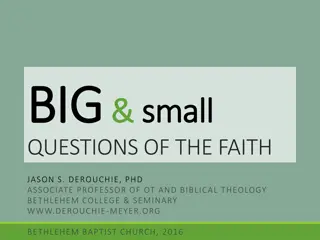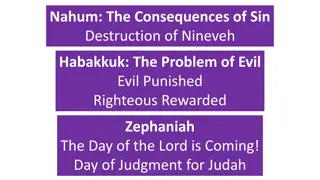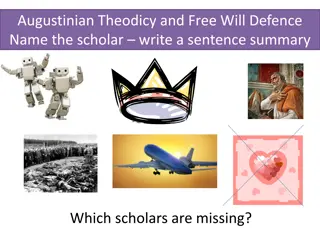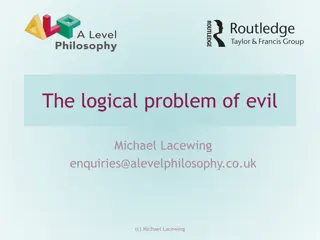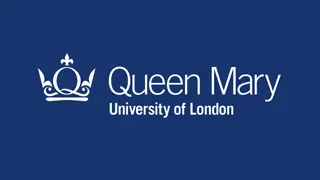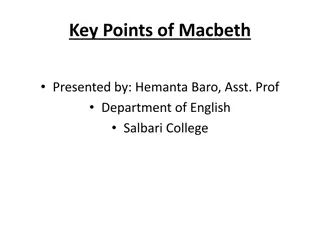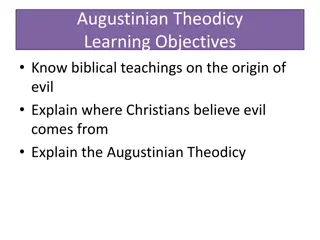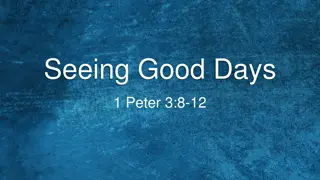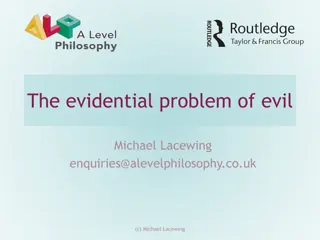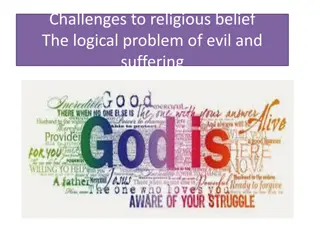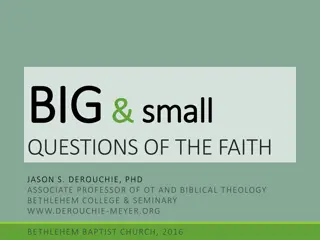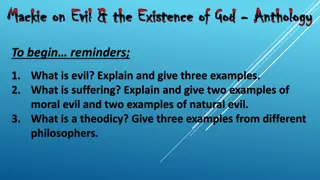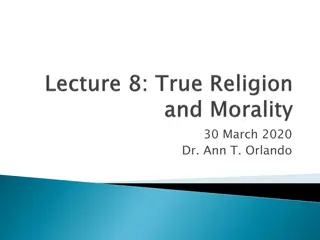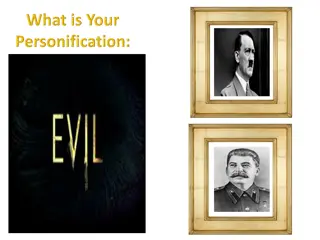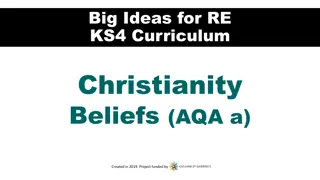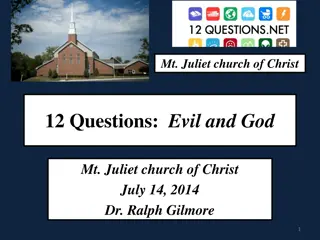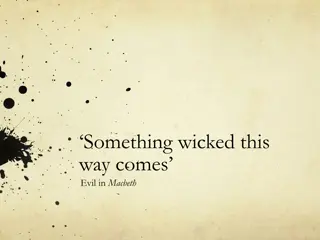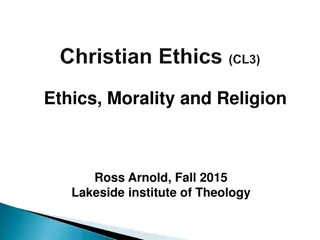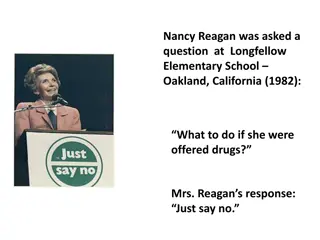Understanding Genocide: Connection Between Ethnic Cleansing and Evil
Explore the concept of genocide, as defined by the UN, through historical events like the Armenian Genocide and the Holocaust. Delve into the depths of evil and its association with acts of genocide within societies, touching upon the banality of evil and the systematic eradication of entire groups.
2 views • 10 slides
Understanding Poll Evil and Yoke Gall in Horses: Symptoms and Treatment
Poll evil and yoke gall are common afflictions affecting horses, particularly in the neck region. Poll evil is an inflammatory condition characterized by a painful swelling at the top of the neck, while yoke gall is localized acute inflammation caused by yoke pressure. Poll evil is typically treated
0 views • 8 slides
Overview of EV Infrastructure Load Model (EVIL) by Alexander Lonsdale
The EVIL model, developed by ADM, provides hourly electricity load shapes for transportation in commercial and residential sectors. It uses R executable scripts and static outputs to drive model output, facilitating scenario building for utility rate structures and energy forecasts. The model functi
2 views • 23 slides
Break Free: Deliverance Prayers on Covenants, Yokes, and Curses
Reject and renounce evil associations, break free from curses and demonic influences, and seek cleansing and protection through powerful prayers in the name of Jesus. Purge yourself of past affiliations, declare freedom from evil spirits, and reclaim your spiritual authority.
0 views • 55 slides
Unveiling the Evil Trinity and its Deception in Revelation
Dive into the intriguing world of the Evil Trinity as depicted in Revelation, where Satan mimics the Holy Trinity with the Red Dragon, the Beast from the Sea (Antichrist), and the Beast from the Earth (False Prophet). Explore the battles in heaven and on earth, and learn how believers can combat dec
0 views • 23 slides
Evolution of Directions on Good Character in Legal Proceedings
The significance of providing good character directions in legal proceedings has evolved over time, progressing from being discretionary to mandatory in certain situations. This presentation delves into the historical development of allowing evidence of good character, the definition of character in
2 views • 33 slides
Unveiling Greek Superstitions: Evil Eye, Walking Sign, and Social Context
Greek superstitions are deeply ingrained in the culture, passed down through generations and encompassing beliefs in the Evil Eye and walking sign. The Evil Eye superstition involves protection charms and rituals against malevolent glares, while the walking sign dictates consequences for crossing le
0 views • 12 slides
Living a Sacrificial Life of Worship and Service in Romans 12:1
In Romans 12:1, believers are urged to offer their bodies as living sacrifices to God, engaging in spiritual service that goes beyond mere worship to encompass all actions in service to God. This involves glorifying God in every aspect of life, showing mercy with cheerfulness, loving without hypocri
0 views • 6 slides
Themes and Characters in Macbeth: An In-depth Analysis
Exploring the themes of evil, conscience, imagery, and literary devices in Shakespeare's Macbeth, this evaluation delves into the role of the three witches, Macbeth's internal battle between good and evil, and the decline of his conscience. Through discussions on morality, symbolism, and character d
0 views • 11 slides
Themes of Contrast and Curiosity in "Dr. Jekyll and Mr. Hyde
The chapters of "Dr. Jekyll and Mr. Hyde" explore themes of aggression, violence, good versus evil, and curiosity through vivid language and character interactions. Contrasting adverbs, negative phrasing, and repetitions are used to highlight the duality of human nature. The characters Enfield, Utte
0 views • 54 slides
Revisiting the Irenaean Theodicy
The Irenaean Theodicy presents a unique perspective on the problem of evil, emphasizing qualities such as human likeness to God, free will, and the role of evil in shaping character towards perfection. It posits that suffering contributes to moral and spiritual development, ultimately leading to a p
0 views • 19 slides
Analysis of "The Last Battle" by C.S. Lewis: Chapter 11 Themes and Reflections
In Chapter 11 of "The Last Battle" by C.S. Lewis, the pace quickens as a battle ensues between Tirian, the Narnians, and the forces of evil led by Rishda Tarkaan. Themes of bravery, treachery, the consequences of sowing evil, and the power of fellowship are explored. The chapter delves into the comp
0 views • 15 slides
Analysis of "Hotel Room, 12th Floor" by MacCaig
An in-depth analysis of the poem "Hotel Room, 12th Floor" by MacCaig, written in 1966. The poem delves into broader questions about humanity, contrasting technological progress with past and present aggression in American society. It explores the balance between light and dark, good and evil, and th
0 views • 29 slides
Carnegie Mellon x64 Assembly: Bomb Lab Overview and Execution
Delve into the intricacies of the Carnegie Mellon Bomb Lab, a unique challenge designed by Dr. Evil. Explore phases, detonations, and how to examine and execute your bomb. Unravel x64 assembly registers, operands, arithmetic operations, and comparisons to outsmart Dr. Evil and progress through the l
0 views • 21 slides
Carnegie Mellon Bomb Lab Overview and Examination
Explore the Carnegie Mellon Bomb Lab, a unique challenge designed by Dr. Evil involving phases, explosions, and careful examination. Delve into x64 Assembly, arithmetic operations, and comparisons to outsmart Dr. Evil. Download your bomb and navigate through the challenges to move forward. Learn abo
0 views • 21 slides
Psychological Evolution in "Evil Robot Monkey" Presentation
Explore the psychological evolution of Sly, a chimpanzee, in Mary Robinette Kowal's short story "Evil Robot Monkey." Sly's journey transitions from the Id to the Superego and eventually to the Ego, showcasing innate instincts, reactions to external stimuli, and the development of personal identity.
0 views • 20 slides
Lessons from the Death of Osama Bin Laden: Zeal, Error, and Human Capacity for Evil
Zeal for faith does not define truth, as seen in Osama Bin Laden's religious fervor. Following the dangerous power of error, Bin Laden's influence led to thousands of deaths due to his distorted beliefs. This serves as a stark reminder of the human capacity for evil and the importance of trusting in
0 views • 9 slides
Understanding the Problem of Evil and Suffering
Exploring the dual nature of evil (moral and natural) and the challenges it poses to belief in a benevolent deity. It delves into examples of evil and suffering, defines evil and its categories, discusses types of evil (moral and natural), and addresses the concept of natural evil.
0 views • 18 slides
Understanding God's Role in Moral Evil and Sin According to Faith
Exploring the complex relationship between God, moral evil, and sin as portrayed in religious teachings. The discussion delves into whether God's ordination of evil diminishes His glory, clarifying that while God permits sin to occur, He is not the author of sin. Various scriptural references are us
0 views • 33 slides
Reflections on Evil, Justice, and Divine Response in Habakkuk
Explore the themes of evil, justice, and divine intervention as depicted in the books of Nahum, Habakkuk, and Zephaniah. Witness the struggles of the righteous amidst a world plagued by sin and injustice, seeking answers from a God who promises to punish evil, reward the righteous, and establish ult
0 views • 12 slides
Exploring the Problem of Evil and Free Will Defense: A Study Set
This at-home study set delves into the philosophical question of whether the existence of evil conflicts with the existence of God, alongside the free will defense. Drawing on research by Erik J. Wielenberg, students will engage with key questions, objections, and deepen their understanding of the p
0 views • 6 slides
Understanding Spiritual Warfare: Principalities, Powers, and Evil Spirits
In this enlightening narrative, the concept of spiritual warfare is explored through biblical references. It delves into the existence of principalities, powers, and evil spirits in the heavenly realms, illustrating their role in intercepting prayers and causing disturbances. Through stories from th
0 views • 9 slides
Exploring Theodicies: Augustine, Irenaeus, and Free Will
Scholars like Plantinga, Kierkegaard, and Swinburne offer insights into the Augustinian Theodicy and Free Will Defense. They discuss issues of human free will, the role of evil, and God's plan for humanity. In contrast, the Irenaean Theodicy emphasizes soul-making, human development, and the eventua
0 views • 28 slides
Exploring the Logical Problem of Evil and Theodicies
The logical problem of evil questions the existence of a supremely good, omnipotent, omniscient God in the face of evil. Two types of evil, moral and natural, are considered. Responses include the free will theodicy and objections regarding choice and free will. Theodicy versus defense is explored a
0 views • 12 slides
The Continuing Duty of Good Faith in Reinsurance Contracts: English Law Perspective
English contract law's view on good faith in reinsurance contracts is analyzed. While no general doctrine of good faith exists in English law, exceptions like the duty of good faith in negotiating and performing contracts as seen in other legal systems are explored. The historical background and rat
0 views • 18 slides
Key Points of Macbeth by Hemanta Baro
This presentation on the tragedy of Macbeth by William Shakespeare delves into key aspects such as major conflicts, the theme of good versus evil, the concept of kingship, the role of the supernatural elements, and an analysis of Macbeth's character transformation. It explores the struggle within Ma
0 views • 9 slides
Understanding Augustine's Theodicy and the Origin of Evil in Christianity
Augustine's Theodicy is a philosophical attempt to justify God's existence despite the presence of evil in the world, rooted in biblical teachings on the origin of evil and human free will. This theodicy explores how Christians perceive the existence of evil, how it relates to sin and redemption, an
0 views • 16 slides
Embracing Good Days with Unity and Hope in 1 Peter
The verses from 1 Peter encourage believers to embrace unity, love, and humility, avoiding evil and pursuing goodness to see good days. Through righteousness, zeal, and a good conscience, believers are urged to honor Christ, prepare to defend their faith, and endure suffering with hope and joy.
0 views • 38 slides
The Evidential Problem of Evil: A Critical Analysis
This discussion delves into the complex philosophical arguments surrounding the problem of evil, examining how the existence of evil intersects with the traditional attributes of a supreme deity. It explores the logical and evidential dimensions of evil's existence in relation to God's omniscience,
0 views • 16 slides
The Logical Problem of Evil in Religious Belief
The logical problem of evil questions how a God who is omnipotent, omniscient, and omnibenevolent could allow evil and suffering to exist in the world. Epicurus' formulation challenges the traditional views on God's attributes and raises questions about why such suffering exists despite the belief i
0 views • 24 slides
Exploring Big Questions of Faith: Understanding God's Sovereignty and Goodness
Delve into the profound theological inquiry of why God allowed sin into the world and how His omnipotence, goodness, and mysterious ways intersect with the presence of evil. Drawing from biblical passages and insights from theologians like John Piper, this exploration contemplates God's glory, His h
0 views • 19 slides
Mackie on Evil & the Existence of God: The Problem of Evil
Mackie, known for defending atheism, argued that the problem of evil challenges monotheistic religions. He critiqued the free will defense, claiming that God's attributes of omniscience, omnipotence, and goodness conflict with the existence of evil. The anthology explores different perspectives on e
0 views • 6 slides
Exploring the Nature of Evil in Philosophy and Religion
Delve into the concept of evil through the lens of philosophy and religion, examining different perspectives on the existence of evil, its relationship with divinity, and its implications for human morality and happiness. From ancient philosophical debates to theological considerations, discover how
0 views • 19 slides
Understanding Evil in the Bible and Society
The Bible depicts evil as originating from the Devil and Satan, with men of the world hating God's light and people in sin. The scriptures warn of growing evil in society, hardened consciences, and the need to stand firm in truth. The changing societal landscape is reflected in discussions on marria
0 views • 7 slides
Understanding the Christian Response to the Problem of Evil
Explore the philosophical problem of evil in relation to belief in God, delve into different Christian responses, such as the theodicies of Irenaeus and Augustine, and consider the implications of evil and suffering on the nature of God in the context of Christian beliefs.
0 views • 6 slides
The Problem of Evil: Exploring Questions on Evil and God
Delve into the complex topic of evil and God through a series of thought-provoking questions and discussions presented by Dr. Ralph Gilmore at Mt. Juliet Church of Christ. Explore the nature of evil, why God allows it, and the theological considerations surrounding this timeless dilemma.
0 views • 17 slides
Visions of a New Earth and Heaven: Revelations and Promises
A reflection on the beauty and peace of a new heaven and earth, free from sorrow, death, evil, and sin. The text describes the holy city of the new Jerusalem, the absence of rebellion, the deliverance from ourselves, and the end of confrontation with evil. It speaks of the promise of a transformed e
0 views • 12 slides
Exploring Evil in Shakespeare's Macbeth: A Deep Dive
Delve into the depths of evil in Shakespeare's Macbeth as critics analyze the play's exploration of the nature of evil. From supernatural elements to tragic consequences, the discussion uncovers the complexity and darkness that pervades the characters and themes of Macbeth. Discover how the play's p
0 views • 26 slides
Exploring Ethics, Morality, and Religion: A Philosophical Journey
Delve into the intricate realm of ethics, morality, and religion as they intersect in human decision-making. Uncover the fundamental questions of right and wrong, good and evil, and the role of religious beliefs in ethical considerations. Explore ancient and modern perspectives on ethics, from agent
0 views • 9 slides
Nancy Reagan's "Just Say No" Response: A Biblical Perspective on Resisting Evil
Nancy Reagan's famous "Just Say No" response to drug offers is analyzed in light of biblical teachings. The importance of using scripture to resist evil and seek God's truth is highlighted as a wise approach to temptation. The concept of saying no as the initial step towards escaping, with a firm co
0 views • 9 slides
